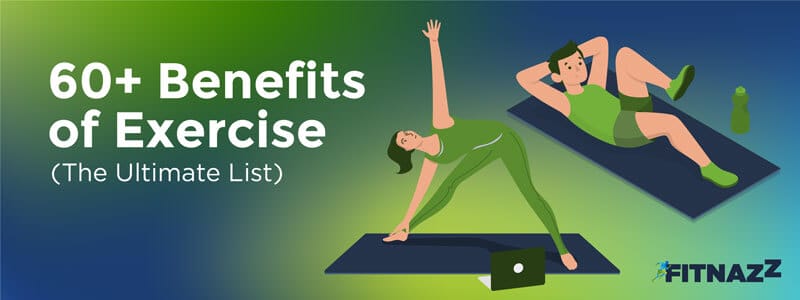You’ve heard it time and again that exercise can be beneficial to your health. But what may surprise you is this: there are at least 60+ benefits of exercises that you could reap if you become physically active now.
Surprised?
Exercise does not only impact our physical body, but it also touches every area of our lives. It is a holistic approach that benefits our mental health, mood, social presence, and beyond.
Here you’ll discover the many benefits of exercising. By the end of this list, you will also learn five simple exercises that you can do at home in just 20-30 minutes, which allows you to reap all the benefits we rounded up for you.
And without further ado, let’s get started.
Benefits of Exercise for Physical Wellness

We are being taught that exercise can be beneficial to our physical health. But how well do you know the positive effects of physical activity on your body?
Let’s find out below.
1. Reduces Body Fat
In one review of 16 studies, it was shown that the more cardio exercise an individual gets, the more belly fat he loses. Cardio, otherwise known as aerobic exercise, is one of the most effective methods to enhance fat burning.
To reduce body fat, experts suggest undergoing 20-40 minutes of cardio daily. That’s equal to 150-300 minutes of moderate to vigorous exercise per week.
Even simple cardio routines like walking, running, and cycling can have significant reductions in abdominal fat.
2. Builds Muscle
Keeping active is one of the most effective methods to develop skeletal muscle, which is one of the three major muscle types.
People build muscle when they follow an exercise with ample time to rest. Eating a balanced diet and healthful diet is also essential when you’re working out to develop muscle.
But what are the best ways to build muscle through exercise? It can be strength training or cardiovascular activity.
3. Strengthens Bones
Like a muscle, bones respond to exercise because they are also active, living tissues. Bones become stronger as they adapt to the stress and strains of physical activity.
Some exercises that benefit the bones the most include weight-bearing and resistance exercises.
Weight-bearing exercises such as walking, jogging, and playing tennis force you to work against gravity. While resistance exercises such as lifting weights help strengthen bones.
4. Maintains Heart Function
There are many ways exercise helps the heart. It includes promoting healthier cholesterol levels, lowering blood pressure, and improving blood sugar regulation.
Aside from those, exercise also helps the heart’s arteries to dilate more readily. It also aids in making your sympathetic nervous system to be less reactive. The sympathetic nervous system is responsible for controlling your heart rate and blood pressure.
While its physiological effects may take weeks, months, or even years to reach full effect, a single exercise session may be good enough to provide immediate and long-lasting protection to your heart.
5. Strengthens Lung Function
Just like how exercise makes your heart stronger, it also strengthens the lungs according to the American Lung Association.
Being active makes your lungs work harder to supply the additional oxygen you need. As you become more physically fit, your lung functions become more efficient at transporting oxygen into the bloodstream down to your muscles.
Moderate exercises such as brisk walking and recreational biking are proven beneficial to the lungs. Physical activity also helps minimize the risk of lung cancer.
6. Improves Brain Function
Regular exercise also helps the brain in protecting your memory and cognitive skills.
According to research, aerobic exercise helps increase the size of the hippocampus. The hippocampus is an area of the brain that is responsible for memory and learning.
Also, exercise helps the brain indirectly by improving mood and sleep and reducing stress and anxiety, which are factors that contribute to your thinking abilities.
7. Improves Immune System
Evidence shows that leading a physically active lifestyle has a positive impact on your immune system.
According to research, exercise reduces the incidence of communicable and non-communicable diseases. Thus, it is implied that exercising improves defense activity as well as the metabolic health of the body.
Frequent exercise also delays the decline in immunity responses associated with aging.
8. Aids the Digestive System
Exercise also positively impacts the digestive system. But how?
Keeping active helps speed up metabolism, regulate weight, relieve stress, and improve blood flow. All of these contribute to a healthy digestive system.
Exercise like yoga and cardio workouts also relieves gastrointestinal symptoms.
9. Nourishes Your Skin
Maintaining an active lifestyle leads to healthier skin.
Some benefits of exercise to the skin include increasing blood flow that helps nourish and revitalize skin cells. The improved blood flow also carries away free radicals in the body.
Since exercise also reduces stress, it aids in easing some skin conditions that worsen due to stress.
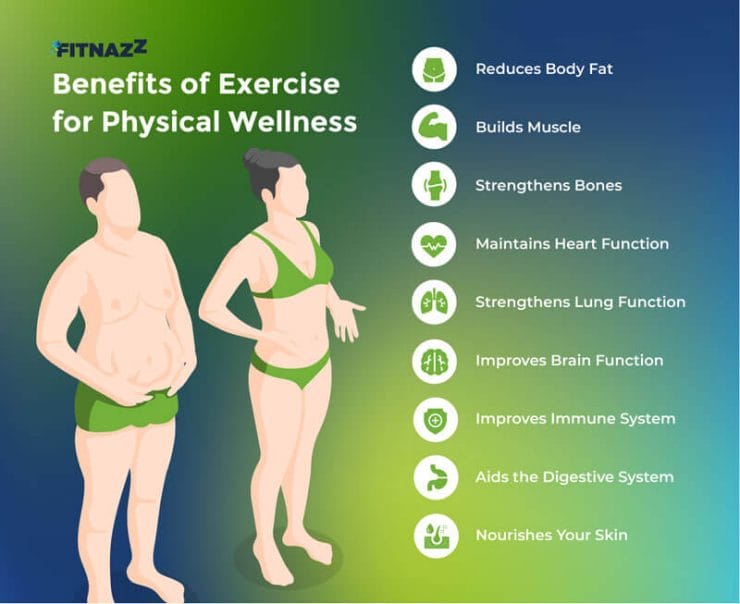
Key Takeaway: Aside from reducing our body fats, developing our muscles, and strengthening our bones, exercise does more in keeping our whole body physically fit. Keeping active maintains a well-functioning heart, lungs, brain, skin, immune system, and digestive system.
Benefits of Exercise for Mental Wellness
Did you know that the benefits of exercise go beyond our physical health? Yes, it even impacts our mental health too.

Exercise touches parts of the brain that has something to do with thinking, memory, concentration, and more. Below, find out the positive impact of exercise on our mental wellness.
10. Sharpens Memory
Several studies show that people who exercise regularly have greater volume in their prefrontal cortex and medial temporal cortex than those who don’t. These are parts of the brain that control memory as well as thinking.
Aerobic exercises such as walking yield these benefits to the brain.
11. Improves Mental Agility
Need a boost in thinking? Take a quick walk or jog.
Regular exercise is shown to boost mental agility as it helps enhance your energy, improves your mood, and helps you get better sleep at night. All of these are essential for a highly-functional brain.
12. Boosts Creativity
If you want to get the creative juices flowing, start exercising.
Being active allows people to come up with new ideas according to experts. Walking, running, swimming and other forms of aerobic exercise are found to stimulate the Brain-Derived Neurotrophic Factor (BDNF) that helps us become imaginative.
This boost in creativity also has something to do with the increase in the size of the hippocampus whenever we are exercising.
13. Improves Concentration
Aside from improving your memory, exercise also helps you focus.
Some studies point out to exercise as the cause of improved concentration in children while studying. Being physically active boosted their executive control, i.e. they got better at multitasking, ignoring distractions, and processing information in their minds.
14. Stimulates Production of Endorphins
Endorphins are hormones that bring about feelings of happiness to individuals. They give us a positive feeling that improves our general well-being.
Stimulating the production of endorphins is another benefit of exercise. But what can these hormones do for you?
They help reduce risks of stress, anxiety, and depression. Physical activities like walking, jogging, swimming, and yoga help you feel good about yourself, aka the “runner’s high.”
15. Increases Relaxation
Since exercise is an effective way to manage stress, it also helps relax the body.
Exercise works by replacing your body’s stress responses with what your body feels when you’re relaxed. Such stress responses include tense muscles, rapid breathing, and increased heart rate.
You can achieve relaxation by performing anxiety exercises such as breathing, mindfulness, and progressive muscle relaxation.
16. Promotes Better Sleep
Experts found out that exercising also helps us fall asleep more quickly and promotes better sleep quality. Although the reason behind this benefit is yet to be pinpointed, they do know that moderate aerobic exercise enhances the amount of slow wave we get.
Slow wave is responsible for rejuvenating our brain and body when we sleep. It is otherwise known as deep sleep.
17. Aids in Anger Management
Having trouble controlling your anger? Exercise can be the answer, too.
The research revealed that anger management exercises help calm people. Experts suggest performing some exercises like running if you know you’re engaging in an angering situation.
Working out before such situations helps you work off some excess energy. Aside from that, it also clears your mind and allows you to think about what is making you angry.
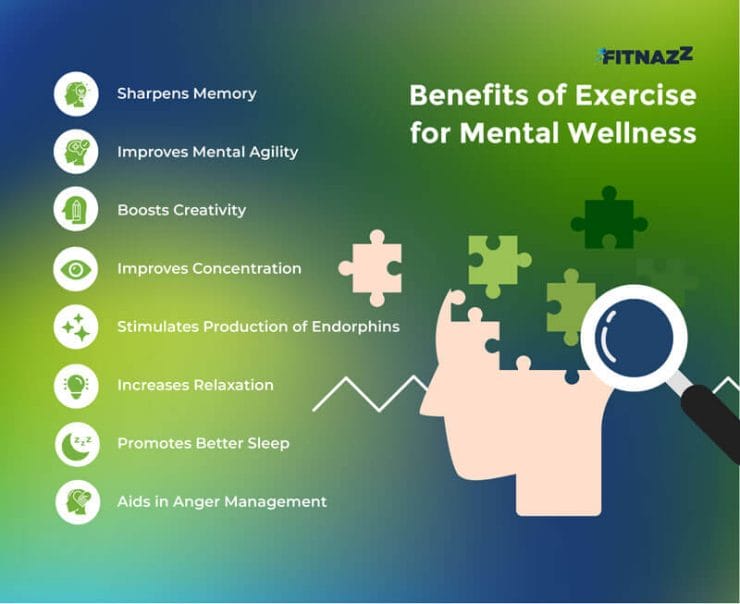
Key Takeaway: Exercising can work wonders for our mental health. Maintain an active lifestyle if you want to experience a boost in your overall brain function.
Benefits of Exercise for Emotional Wellness
Fact: exercise helps us better manage our emotions. If you’re having a hard time controlling your feelings, you may be surprised how keeping active can improve your overall emotional wellness.

18. Improves Mood
When you engage in exercise, it can have an enormous impact on your mood.
Exercise may improve mood due to a combination of various reasons. This includes increasing the production of serotonin and endorphins, which help the brain regulate mood and affect mood.
It also helps reduce immune system chemicals that worsen depression, as well as help you normalize your sleep patterns. Exercising also helps you focused on activities, giving you a sense of accomplishment.
19. Reduces Stress
Stress can cause emotional symptoms like irritability, mood swings, and compulsive behavior. While it’s virtually impossible to eliminate stress, you can manage it by becoming physically active.
Studies show that exercise is effective in reducing fatigue as well as making yourself feel better. It also improves the quality of sleep, which is crucial in reducing stress.
20. Feels Less Anxious
Studies found the connection between anxiety and a sedentary lifestyle. So, if you want to improve your quality of life, it’s time to start moving around and getting some workout.
Exercise diverts your focus from what you’re anxious about. It also decreases muscle tension as you move your body, while it changes your brain chemistry as you get your heart rate up.
21. Reduces Feelings of Depression
Harvard Health stated that in some cases, exercise is as effective as drugs. For some, it works as well as anti-depressants.
For most people, low-intensity exercise is sustained over time. When this happens, we stimulate the production of neurotrophic or growth factors. This release of proteins causes nerve cells to grow, making new connections.
This development in brain function makes us feel better, countering mild to moderate depression.
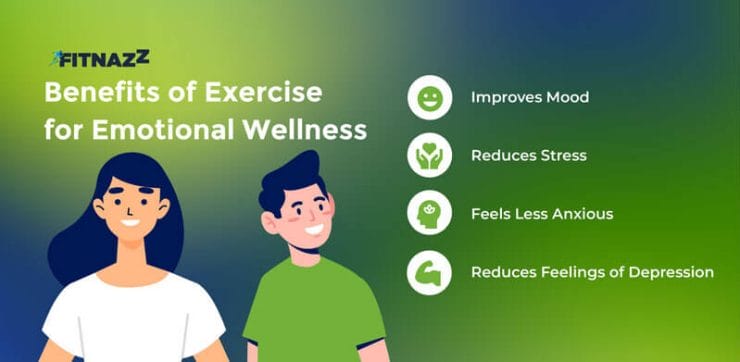
Key Takeaway: Surprisingly, exercise helps reduce stress, anxiety, and depression. This helps improve your mood, positively impacting your emotional health.
Benefits of Exercise for Social Wellness
How’s your social presence keeping up? If social wellness is becoming a concern for you, it’s time to maintain an active lifestyle. Because yes, exercising also has benefits for your social life.

Here’s how keeping active helps you socially.
22. Boosts Self-Esteem and Confidence
Being physically active helps your self-esteem in various ways. First, since exercise often results in an improved body image, it makes you feel good about yourself.
Feeling strong also helps create a positive outlook in life. You get a better sense of yourself when you make your heart, bones, muscle, and lung stronger, and when you are fighting off diseases through exercise.
All these are attributes of self-esteem and confidence that you get when you exercise.
23. Presents the Opportunity to Socialize
When you go to the gym for a workout, you get to meet people. The same goes true when you join sports and be in a team.
This just shows a strong connection between being physically active and socialization. This also helps your leadership skills, promotes teamwork, as well as builds empathetic behavior.
24. Helps you Make Friends
The next thing after socialization is making friends. Exercise presents you with a chance to build your social circle with fellow physically active individuals.
Say, walking, running, or biking lets you discover new places around town. And this is an opportunity to meet new people. The same goes true when you participate in community events like a marathon.
In a school setting, kids also make friends through physical activities. Even older adults can ease loneliness by meeting fellows during their habitual exercise.
25. Alleviates Loneliness
Speaking of older adults, seniors are prone to social isolation and loneliness. And these can result in higher risks for several conditions such as heart diseases and depression.
Thankfully, physical activity interventions can reduce their loneliness and improve their mental and social well-being.
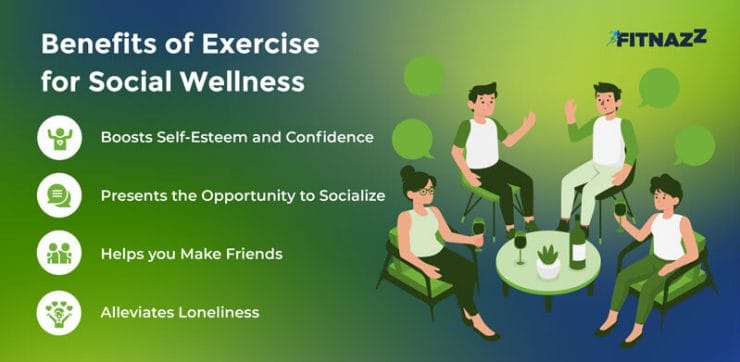
Key Takeaway: Exercise is an opportunity to socialize. Boost your self-esteem and confidence by working out, and seize this opportunity to make friends.
Benefits of Exercise for Various Disease Treatment and Prevention
Are you or your loved one suffering from a certain kind of ailment? If yes, exercise might help.

According to research, regular physical activity like exercising can help reduce your risk for several diseases and health conditions. Below, we identified the health problems that you can combat with regular exercise.
26. Cancer
Experts say exercise plays a role in the prevention of cancer. Keeping active reduces inflammation, control weight, and boosts the immune system which are all crucial in fighting the disease.
Regular exercise may lower the risk of 13 types of cancer according to studies from the American Cancer Society and the National Cancer Institute. It also boosts the quality of life during cancer treatment.
27. Diabetes
Exercise is found to help in managing diabetes. It helps counter insulin resistance by enhancing your body’s sensitivity to insulin.
When you exercise, you also reduce symptoms of diabetes from controlling your weight, improving blood sugar levels, improving your overall fitness and well-being, and reducing your risk of stroke and heart disease.
28. Stroke
Habitual exercise has positive effects on a number of risk factors that lead to stroke, including diabetes, hypertension, and obesity. This means you reduce the risks of stroke when you exercise regularly.
Aside from prevention, exercise is also shown to help patients recover after suffering a stroke.
29. Heart disease
Regular exercise strengthens the heart muscle, lowers blood pressure, and reduces bad cholesterol in the body. These are all major factors that contribute to the prevention of chronic heart diseases.
30. Hypertension
If you’re suffering from high blood pressure, you may not be getting enough exercise. It’s true because these two were found to be closely related.
So, what should you do? Your doctor may recommend getting some exercise because it can make a big difference.
Starting slowly on exercise helps you control blood pressure as it makes your heart stronger. And a stronger heart needs less work to pump blood, lowering pressure.
31. Obesity
Exercise is an efficient way to help control weight and prevent obesity. Keeping active can help burn calories and reduce body fat, which enables you to maintain a healthy weight.
When combined with proper diet, exercise plays a crucial role in obesity prevention.
32. Asthma
Some forms of exercise may trigger asthma. However, with activities that focus on regular breathing and promoting lung capacity, exercise can be beneficial to asthmatic individuals.
Suitable exercises like yoga and swimming help improve the symptoms of asthma in the long-term. Often, it helps control the frequency and severity of asthma attacks.
33. Back Pain
Regular exercise leads to stronger, flexible, and well-balanced muscles, which help you maintain good posture. A good posture is essential in the prevention of back pain.
34. Traumatic Disorders
Regular exercise is also found to help treat traumas such as post-traumatic stress disorder (PTSD). In one study of 12 PTSD patients, evidence revealed that exercise intervention helps alleviate symptoms of PTSD.
Aside from reducing symptoms, research also suggests that keeping active helps patients improve coping strategies through a more positive self-identity, a renewed sense of hope and determination, as well as an increased quality of life.
35. Addiction
Exercise also shows promise in treating addiction.
Few studies suggest that patients involved in the abuse of a variety of substances showed notable results after exercising. Being active helped them get distracted from cravings.
Workouts have helped them build positive social connections. Combined with other therapies, exercise has also helped them with their depression and anxiety.
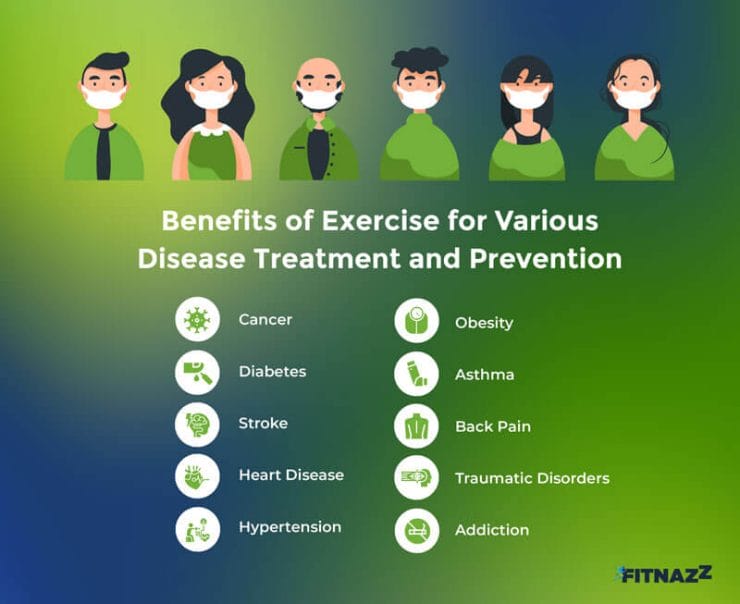
Key Takeaway: Regular exercise keeps the doctor away. Stray from your sedentary lifestyle now if you want to reduce the risks of various diseases.
Benefits of Exercise for Productivity
Feeling unproductive at work? If you’ve already tried all means to improve your performance and nothing seems to work, try exercise.

Here are some ways exercise helps boost your productivity.
36. Relieves Workplace Stress
Workplace stress is one serious factor that intervenes with your productivity. One key to reducing it is—yep, you guessed it right—through exercise.
The American Council on Exercise advises you to engage even in one exercise session. This is because it can lead to up to two hours of relaxation, which is essential in boosting your productivity.
To reach peak performance, they also suggest exercising outdoors in a more stress-free environment.
37. Boosts Energy
If your energy level is consistently going down throughout the day, it can deal a great blow in your productivity. Good thing staying active can help you boost that energy at work.
Research suggests that when you utilize your stored-up energy through exercise, you are actually making more of it. The key is to schedule your workout and stick with it.
38. Improves Alertness
When you exercise, you get a boost in energy and stamina. Your mood improves and workplace stress is reduced.
These all contribute to an increase in mental alertness at work.
39. Sharper Memory and Thinking Skills
The same part of the brain that gets a boost during exercise also helps improve our memory and learning capability. If you need to solve some problems at work that needs thinking, you better take a quick walk outside to improve your thinking ability.
40. Reduces Chances of Afternoon Fatigue
Feeling slump after taking your lunch? Fight it off with exercise.
One study shows that employees who engage in exercise are less likely to suffer from afternoon fatigue, aka post-lunch dip. This suggests that exercise helps individuals perform better in their job.
41. Decreases Lost Workday Productivity
Exercise improves your overall fitness, most especially boosting your immune system. When you have better immunity, you are less likely to catch diseases during your workdays.
With improved health, you aren’t prone much to go on sick leave that decreases your productivity.
42. Builds Social Connections
Exercising in the office can help you connect with your colleagues. Interacting with them helps you develop a bond.
When you grow comfortable with them, you can be comfortable sharing your ideas with your co-workers. This leads to the best ideas at work that make a productive team.
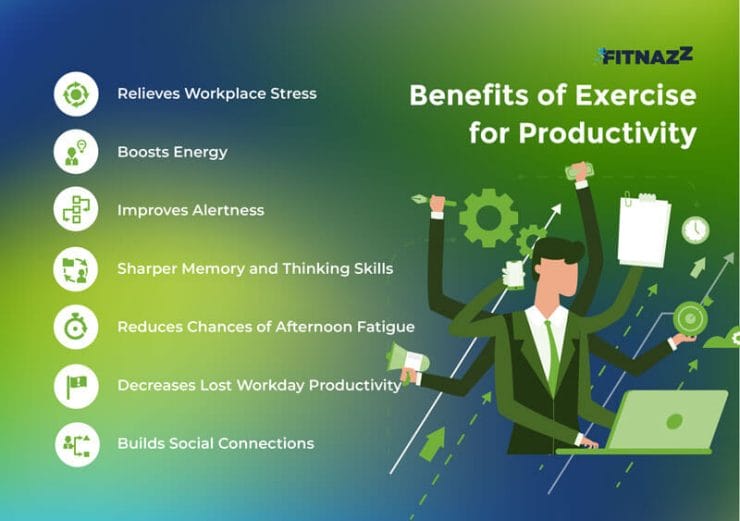
Key Takeaway: Exercise is crucial in every workplace. To improve productivity in the office, it’s time to adapt the “Sit Less, Move More” program now.
Benefits of Exercise for Children
Do you have an inactive kid? Research shows that inactive children are likely to become inactive adults. This puts them at risk of developing life-threatening conditions such as heart disease, diabetes, and cancer.

This is why it’s crucial for children to learn the importance of exercise at an early age. Below, we rounded up some of the most common benefits of exercise for kids.
43. Improves Overall Fitness
Regular exercise gives that extra boost in energy. This allows kids to be more active without feeling tired throughout the day.
44. Builds Leaner Bodies
A physically active kid has less risk of becoming overweight. This is because exercising increases their total energy expenditure, helping them to decrease total body fat and slowing the development of obesity.
45. Promotes Good Posture
To have a good posture, a child must have strong, flexible, and well-balanced muscles. Since regular exercise helps build healthier muscles, it can result in improved posture and balance in the body.
46. Improves Academic Scores
One study found kids who are active 20 minutes before a test are more likely to get better academic scores.
This can be attributed to the boost in memory that children experience after exercising. Exercising improves the size of the hippocampus that is responsible for consolidating information from short-term, long-term, and spatial memory.
47. Enhances Problem Solving
In another study from the University of Illinois, it revealed that a 30-minute spent on the treadmill improved children’s problem-solving by 10%.
This is thanks to the effects of physical activity on creativity, which has been shown to boost convergent and divergent thinking.
48. Encourages a Better Outlook in Life
Physical activities impact a child’s mental health positively, affecting how they perceive the world. This is thanks to the feel-good brain chemicals that exercise is releasing.
49. Contributes to Happiness
A physically active child is a happy child. Exercise is known to release endorphins which affect our happiness level.
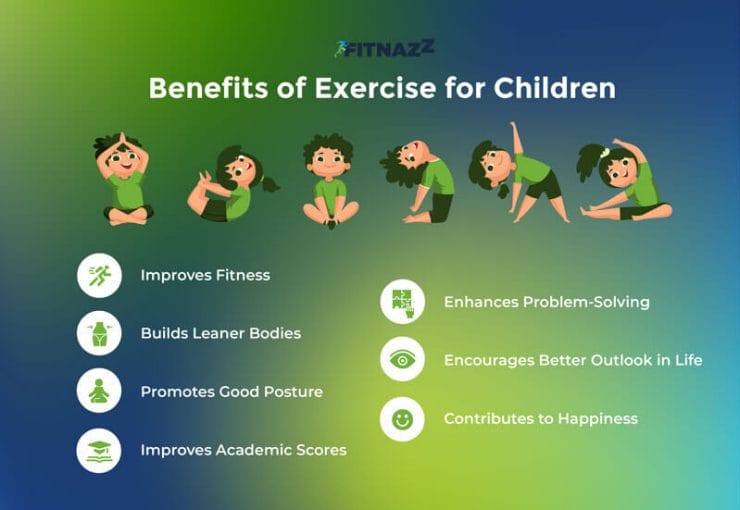
Key Takeaway: Children must develop an active lifestyle at an early age. This helps them grow up to a healthier adult, so encourage your kids to exercise regularly now.
Benefits of Exercise for Seniors
Contrary to popular beliefs, elderly people should continue exercising the more they age. There are surprising exercise benefits to the elderly when they hit retirement age, most notably reducing the risk of chronic diseases such as stroke and heart disease.

Aside from those, here are some additional benefits of exercise for seniors.
50. Reduces the Risk of Falls
Seniors are at a high risk of slips and falls. When they get injured from falls, it takes them longer to recover from the accident.
But when they exercise regularly, such risk is reduced.
Exercising improves strength and flexibility which leads to improved balance and coordination among older adults.
51. Reduces Fear
With a reduced risk of falls, elderly people can have more confidence in living their lives. The Journal of the American Geriatrics Society noted that seniors who exercise regularly have reduced fear of falling.
52. Encourages Independence
With a reduced risk of falls, individuals who belong to the older age group can move freely without needing supervision.
53. Prevents or Delays Various Diseases
With an improved immune function due to regular exercise, elderly people can prevent or delay the onset of diseases related to aging. This includes heart disease, stroke, diabetes, and even cancer, among others.
54. Prevents Osteoporosis
Seniors who still commit to regular exercise are building better bone mass and density than those who don’t. This helps prevent bone loss as we age.
This is why health experts recommend exercise for osteoporosis.
55. Prevents Arthritis
People with arthritis benefit from exercising as it is shown to be effective in reducing pain and stiffness in patients. It also improves their range of motion and overall strength.
Since keeping active helps you lose weight, exercising also lessens the pressure on your joints.
56. Delays the Development of Disability
Seniors who are keeping active delays the development of disabilities that come with aging. Even simple exercises like walking and running can have significant effects on delaying such disabilities.
57. Improves Cognitive Function
Regular physical activity improves the elderly’s thought process. Exercising increases brain neurons that are responsible for improving your memory.
58. Reduces the Risk of Developing Dementia
With an increased cognitive function, seniors can decrease the risk of developing dementia.
A sedentary lifestyle contributes to the development of such memory condition according to the Journal of Alzheimer’s Disease. Keeping an active life can help combat it.
This can also be attributed to the fact that exercising helps slow the shrinkage of the hippocampus. The hippocampus is the part of the brain responsible for memory.
59. Promotes Social Engagement
Exercising can be a fun social event. Attending group fitness classes lets you create social ties, which is crucial for aging adults.
Social engagement gives you a sense of purpose, eliminating feelings of loneliness and depression.
60. Increases Life Expectancy
A sedentary lifestyle is also one of the leading causes of death in older people. That’s according to the WHO.
If you want to live longer, regular exercise can increase lifespan by around three to five years based on studies. Even gentle activities such as walking or swimming can help you live longer.
61. Improves quality of life
Aside from physical fitness, exercise also has psychological benefits to the elders. Their newfound mobility and independence help ease symptoms of depression and fight loneliness in older people.
As a result, seniors experience an improved mood in general. This leads to a happier life after retirement.
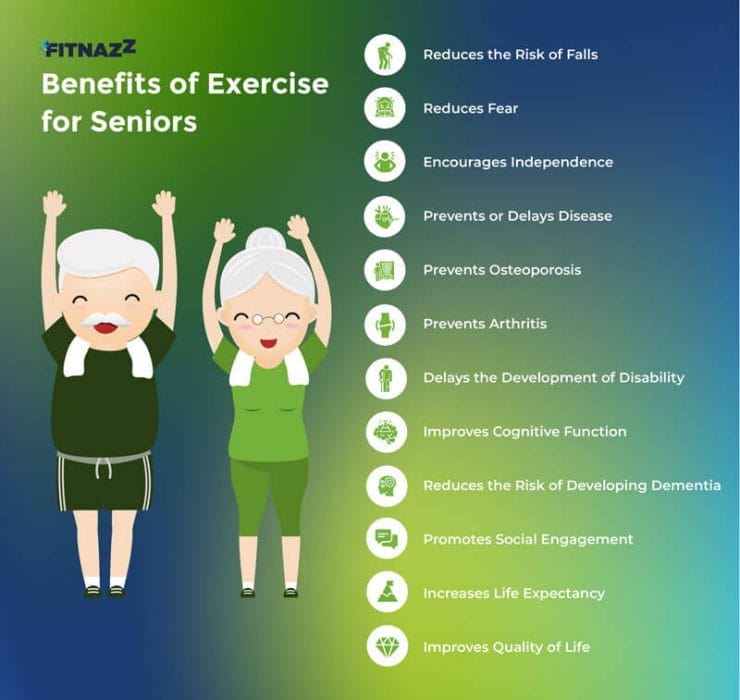
Key Takeaway: Seniors should maintain a physically active lifestyle the more they age. Exercising offers important benefits that may help prolong their lives.
[mailpoet_form id=”2″]
FAQs
Got some questions about the benefits of exercise? We may have the answer for you below.
1. How much exercise should adults do?
According to the American College of Sports Medicine, working at least 2.5 hours per week can already have significant benefits to your health. Exercise at a moderate intensity.
Adults should engage in strengthening activities that work all the major muscles.
2. How much exercise should children do?
Children aged five to 18 should aim for an average of 1 hour of exercise per week. They should exercise at moderate intensity.
Moderate activity in children includes playground activities and aerobic exercises.
3. How much exercise should seniors do?
Older adults aged 65 and over should aim for an average of 2.5 hours of exercise per week. Exercise at a light to moderate activity.
Seniors should focus on activities that improve strength, balance, and flexibility such as walking, moving around home, and dancing.
4. What time of the day should you exercise?
Early morning exercise makes the most of your biology and psychology. Science proves that exercising in the morning works because your body’s hormonal composition during that time is aligned with your goal. You get more energy from your fat reserves in the morning which is essential for working out.
However, the most important thing about exercise is to pick a time of the day where you can stick with your schedule.
5. What is the best exercise for productivity?
The best types of exercise to increase productivity include walking, yoga, low-intensity aerobic exercise, and strength training exercise.
6. Is there such a thing as too much exercise?
Yes. More exercise is not necessarily better.
Individuals who engage in strenuous exercise may not get additional benefits than people who exercise at moderate amounts.
It is also crucial to give your body a chance to recover from the stress of exercising.
7. What are some warning signs that I should stop exercising?
Your body sends some signals to warn you if you’re doing something wrong while exercising. These signs may include the following:
- Unusual pain in the body (e.g. chest pain)
- Sudden lightheartedness
- Cold sweat
- Fainting
- Muscular/joint pain
- Nausea
- Dizziness
Stop immediately with your work out if you feel the above signs. Always ask your doctor for the best practices of exercising.
8. Is one type of exercise better than another?
This depends on your specific goals.Some types of exercises are better fit for a specific goal. For instance, if you want to increase your breathing and heart rate, you may opt to do aerobic exercises. If you want to strengthen your muscles, you should engage in strength exercises.
Which benefit convinces you to exercise? Which benefits would you like to share with your loved ones? Comment your answers below!

